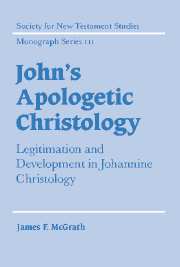Book contents
- Frontmatter
- Contents
- Preface
- Part 1 Introduction
- Part 2 Jesus and God
- 3 Are there ‘two powers’ in John?
- 4 God's equal or God's agent? (John 5)
- 5 ‘I obey, therefore “I am”’ (John 8.12 – 59)
- 6 ‘You are gods’ – but who are ‘you’? (John 10.22 – 39)
- 7 In the bosom of the Father (John 1.1 – 18)
- 8 Conclusion to part 2
- Part 3 Jesus, Moses and Torah
- Part 4 Other issues and conclusion
- 16 Conclusion
- Bibliography
- Index of biblical references
- Index of authors
- Index of subjects
8 - Conclusion to part 2
Published online by Cambridge University Press: 22 September 2009
- Frontmatter
- Contents
- Preface
- Part 1 Introduction
- Part 2 Jesus and God
- 3 Are there ‘two powers’ in John?
- 4 God's equal or God's agent? (John 5)
- 5 ‘I obey, therefore “I am”’ (John 8.12 – 59)
- 6 ‘You are gods’ – but who are ‘you’? (John 10.22 – 39)
- 7 In the bosom of the Father (John 1.1 – 18)
- 8 Conclusion to part 2
- Part 3 Jesus, Moses and Torah
- Part 4 Other issues and conclusion
- 16 Conclusion
- Bibliography
- Index of biblical references
- Index of authors
- Index of subjects
Summary
Having examined the main passages in the Fourth Gospel which relate to the conflict between the Johannine Christians and ‘the Jews’ over the relationship between Jesus and God, we may now seek to draw together the overall results and conclusions which arise from this part of our study.
First, we have found no reason to deny or qualify the Evangelist's statement of his purpose in 20.31. His aim is to convince people (whether those who already believe or unbelievers is irrelevant for our present purposes) that Jesus is the Christ, the Son of God. We have found no evidence that the Evangelist is seeking to defend the idea that Jesus is, for example, the Word-become-flesh. Rather, the Word/Wisdom imagery that we have encountered appears to serve as part of a defence of the Messiahship of Jesus as understood by many, if not indeed most or all, early Christians. The Evangelist seeks to defend and legitimate the Christian view of Jesus as the one to whom God has given authority as his agent and viceroy, who sits at God's right hand and even bears God's own name. All of these ideas are earlier than John, and the distinctively Johannine use of the imagery and ideas which he inherited from early Judaism and Christianity we have seen to be part of John's legitimation.
- Type
- Chapter
- Information
- John's Apologetic ChristologyLegitimation and Development in Johannine Christology, pp. 145 - 148Publisher: Cambridge University PressPrint publication year: 2001



